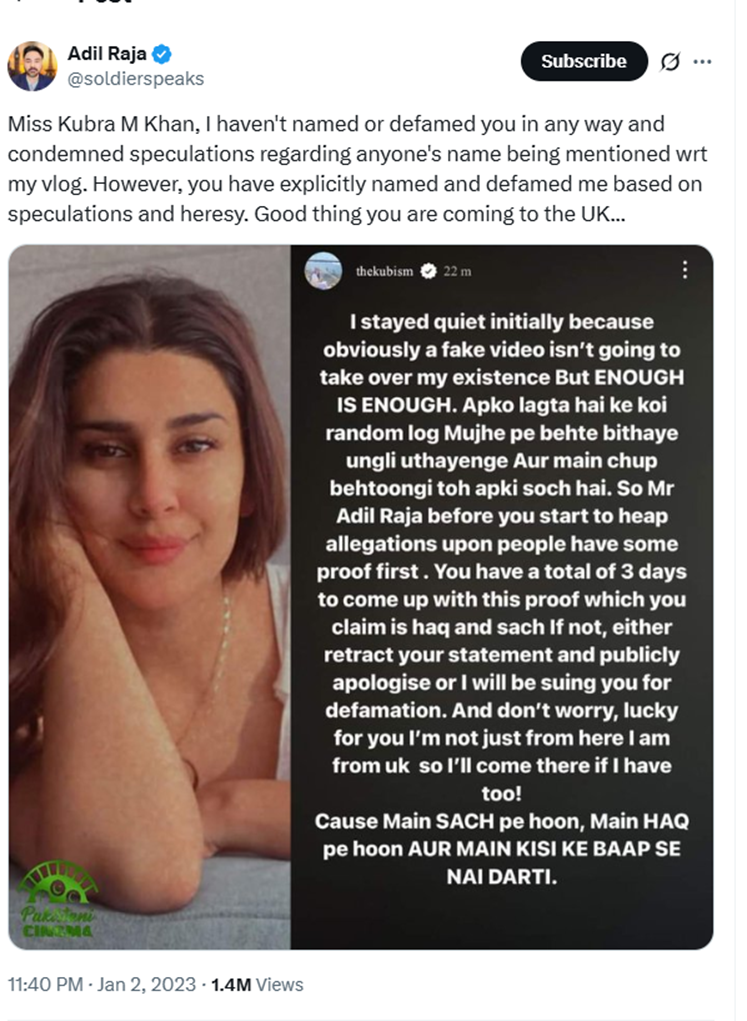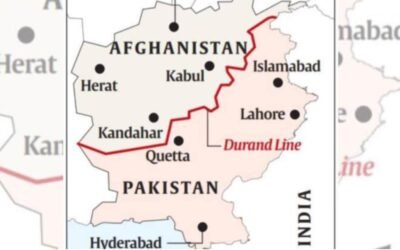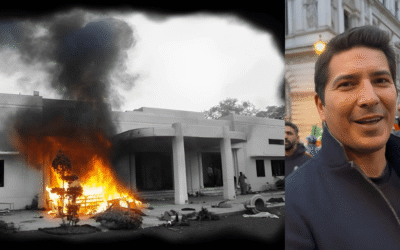Major (Retired) Adil Raja, who previously served in the Pakistan Army and now works as an online commentator, has attracted significant attention and controversy with his remarks about Pakistan’s security forces and prominent individuals. A closer look reveals a worrying pattern of spreading misinformation. Many of Raja’s claims, including those based on fake documents and unsubstantiated accusations, have been thoroughly debunked by courts, fact-checkers, and official sources. This article details the timeline of his false statements, the responses from institutions, and the implications for public trust.
Raja’s timeline of misinformation includes fake documents, character defamation, unproven accusations about terrorism and elections, and a damaging UK court ruling. These claims have not only been legally challenged but have also degraded his public credibility.
Defamatory Allegations Against Actresses (December 2022–January 2023)
 Raja claimed that four “top models and actresses” had covert ties with senior military officials, citing only initials such as MK, MH, SA, and KK/AK. Dawn reported that one named suspect, Kubra Khan, categorically denied any association and threatened legal action in the UK over defamation. Dawn and Geo News regarded his allegations as character assassination without factual backing. In response, Raja tweeted apologetically:
Raja claimed that four “top models and actresses” had covert ties with senior military officials, citing only initials such as MK, MH, SA, and KK/AK. Dawn reported that one named suspect, Kubra Khan, categorically denied any association and threatened legal action in the UK over defamation. Dawn and Geo News regarded his allegations as character assassination without factual backing. In response, Raja tweeted apologetically:
“Miss Kubra M Khan, I haven’t named or defamed you in any way…”
However, Kubra emphasised her intent to pursue a lawsuit, urging Raja to substantiate his claims within three days or formally retract them. While the public acted wisely, recognising the fake agenda of Raja against the state and prestigious institutions.


Terror Attack in Pahalgam Allegations (May 2025)

In May 2025, following a terrorist attack near Pahalgam, Raja alleged that Pakistan’s army chief, General Asim Munir, orchestrated the incident with “tacit Chinese approval.” He shared these claims in a YouTube video and tweeted similar assertions about intelligence sources backing his allegations. The footage provides Indian extremist media with the opportunity to talk nonsense about the Pakistan Army, which clearly shows forces behind Adil Raja. However, no international media, recognised intelligence agency, or official investigation has substantiated these statements, and security analysts have dismissed them as speculative and unsubstantiated.

Election Rigging via Form‑47 (February–March 2024)
During Pakistan’s February 2024 general elections, Raja claimed that the military manipulated Form-47 results to influence outcomes against the PTI. Although allegations of irregularities sparked public outcry and protests, no judicial or institutional inquiry confirmed these specific claims. Media commentators observed the lack of documented verification, concluding Raja’s commentary remained conjectural rather than evidence-based.
UK Defamation Ruling (April 2024)
Perhaps most consequential was a UK High Court verdict in April 2024. Raja was found to have published nine false and defamatory statements about retired Brig. Rashid Naseer. The court awarded damages of £10,000 (later increased to approximately £19,100) and clearly stated that Raja’s assertions were “unsubstantiated factual allegations.” Legal experts viewed the ruling as a precedent highlighting that freedom of speech on digital platforms does not mean freedom from accountability.
Impact on Public Trust
Raja’s repeated false claims have eroded his credibility, especially after being discredited by respected fact-checkers and legal decisions. His faithful followers remain a vocal community on platforms such as Reddit and YouTube, but an increasing number of observers regard him with scepticism. Notably, independent platforms and mainstream media have distanced themselves from his narratives, reinforcing the crucial value of verified reporting in maintaining public trust and credibility.

Raja’s story highlights a worrying trend in our online world: false information can quickly attract attention, but it often collapses when faced with serious investigation. His journey—from spreading conspiracy theories to facing legal challenges—serves as a warning for anyone who creates or consumes content online.

Major (Ret.) Adil Raja has been involved in several controversial incidents, during which he made false claims. These include making untrue accusations against well-known individuals, alleging terrorism and interference in elections without proof, and being the subject of a negative legal ruling in the UK. In each case, credible organisations found his statements to be untrue. Raja’s situation demonstrates the dangers of prioritising sensational stories over facts. His experience offers an important lesson for discussions in Pakistan: trust is built on solid evidence, not just popularity. Without this proof, influence can decline, and reputations can suffer. This highlights how misinformation can impact public discourse and underscores the importance of reliable sources reporting.








